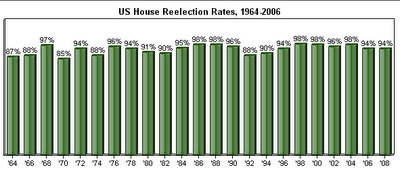According to a new poll by CBS News and the New York Times:
- 8 percent of Americans want the members of Congress reelected.
- 80 percent of Americans said members of Congress are more interested in serving special interests than the people they represent.
- 75 percent disapprove of the job Congress is doing.
These numbers complement perfectly the latest (October 2008) national polling that shows that 83 percent of Americans support term limits on their elected officials. All show a bi-, tri- and non-partisan yearning of the American people for the lost tradition of rotation in office that our Founders intended.

So this means that incumbents will get clobbered in the 2010 elections? Well, maybe, but history shows that nearly all the change will occur in competitive open seat elections. Even in the dramatic years of change, such as 1992-94 and 1996-98 (see chart above), Congressional incumbents won overwhelmingly in spite of the mood of the country that showed up clearly in competitive races.
Please note the Massachusetts message was only made possible by the opening up of Sen. Ted Kennedy's seat. In other anticipated upsets -- Rand Paul in Kentucky and Marco Rubio in Florida, for example -- it is the open seats that are giving voters their voice.
Only an institutional reform like term limits can fix the institutional problem of entrenched incumbency. In the meantime, voters can take advantage of open seats as they occur to meaningfully express their will. But with term limits, it will not require crisis, retirements and luck to effectuate change. Instead, there will be rolling open seats in every district in the nation, drastically improving the people's representation on a regular basis.
(Thanks to the Center for Responsive Politics for the image above.)